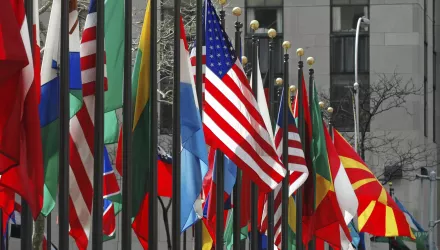More than two decades of U.S.-Russian cooperation to keep potential nuclear bomb material out of terrorist hands largely came to an end last month, as The Boston Globe reported Monday. Although the dangers have not gone away, Russia is no longer interested in working on most nuclear security projects with the United States— yet another victim of increasing tension between the two countries. The Belfer Center has been centrally involved in these efforts since their inception. Belfer Center experts Graham Allison, Matthew Bunn, and William Tobey offer their thoughts.
Expert Statements
"The death of the US-Russian nuclear security alliance is an occasion for sadness and somber reflection. Anyone serious about the threat of terrorists exploding a nuclear bomb in an American city should recognize that risk will now increase. The nuclear security alliance between the US and Russia was unique. What it accomplished over the 23 years since the Soviet Union imploded, is still hard to believe. As the Soviet Union was collapsing, a central question was: What would happen to its superpower nuclear arsenal? When Secretary of Defense Dick Cheney was asked this question just months before the collapse, he answered: “If the Soviets do an excellent job at retaining control over their stockpile of nuclear weapons and they are 99 percent successful, that would mean you could still have as many as 250 that they were not able to control. To meet that challenge, Senator Sam Nunn and Richard Lugar stepped forward with a big, bold idea. They invented the most significant national security initiative in the post-Cold War era. Nunn-Lugar legislation established and funded a program that gave US Defense Department officials a direct role in shaping the post-Soviet nuclear future. 23 years after Cheney's forecast, how many nuclear weapons from the former Soviet superpower arsenal have proliferated? Not the 250 Cheney predicted. Not 25. Miracle of miracles, not a single nuclear weapon has been discovered outside the control of Russia's nuclear custodians. For this we should be eternally grateful."
Graham Allison, Director, Belfer Center for Science and International Affairs
"This is the end of an era. Except for a few small remnants, Nunn-Lugar and its successors in Russia are over. But whatever our differences over Ukraine, Russia and the United States, as the world's leading nuclear powers, have a responsibility to work together to ensure that their nuclear stocks, and other nuclear materials around the world, cannot be stolen and fall into terrorist hands. Keeping up a dialogue and spirit of cooperation among technical experts is key — from the Cold War to today, such personal relationships among scientists and experts have often paved the way for solving problems. It's time to build a new kind of cooperation — a partnership among equals, not a donor-recipient relationship."
Matthew Bunn, Professor of Practice, Harvard Kennedy School
"Over two decades of U.S. and Russian cooperation to improve nuclear security in Russia and elsewhere made the world safer and reduced the risks of nuclear terrorism. While nuclear security is vastly better than it was in the early 1990s, the work remains incomplete, and much of it is at risk of deterioration. Moscow's decision late last year effectively to end this cooperation, and Washington's failure to anticipate it and to forestall it, leave the world more vulnerable to the danger that terrorists might steal fissile material or nuclear weapons, even as we are seeing new and more vicious groups emerge."
William Tobey, Senior Fellow, Belfer Center for Science and International Affairs

